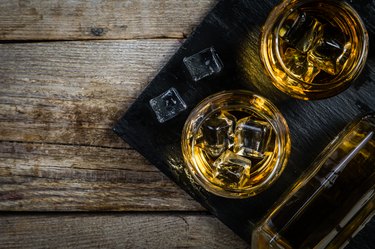
Whiskey contains anywhere from 64 to 80 calories per ounce, but the effects of the spirit don't end there. Alcohol has an effect on every system of your body — from your brain to your digestive tract — far beyond the calorie count of any drink you consume.
The number of calories in your scotch also depends if you consume it with popular mixers, such as cola or sour mix. These calories can add up, and thwart efforts to manage your weight.
Video of the Day
Tip
The calories in scotch whiskey depend on the proof. Lower proof scotch has fewer calories: 64 calories per ounce for 80 proof and 80 calories per ounce for 100 proof.
What is Scotch Whiskey?
Scotch is a spirit made from cereal grains, water and yeast. The word "whiskey" actually comes from a Gaelic word that means "water of life." Scotch whiskey must be matured in Scotland for at least three years, and is bottled at a minimum strength of 80 proof, which is 40 percent alcohol by volume. Scotch whiskey is also sold in 100-proof formulations, which clock in at 50 percent alcohol by volume.
Read more: What to Drink and When to Drink It
A standard serving of alcohol, as defined by the Centers for Disease Control and Prevention in the United States, is 1.5 ounces. With this serving size, an 80-proof scotch whiskey provides 97 calories while 94-proof whisky contains 116.
Of course, most mixed drinks made with Scotch whiskey are going to have a higher calorie load. Add a little water to your scotch, however, and you get no added calories. The classic scotch and soda, made with club soda, adds bubbles to your drink, but no extra calories either.
Add 3 ounces of sour mix to create a Whiskey Sour, you'll get 80 more calories in your drink. A drink made with 8 ounces of regular cola adds 110 calories on top of the count already found in whatever proof you are drinking.
Scotch Calories Add Up
If you have a few drinks, especially cocktails made with mixers, the calories contribute to your daily intake, and can cause weight gain if drinking is a regular habit. As Medline Plus points out, most alcohols have little to no nutritional value — so these calories add no real benefit to your diet.
Alcohol can also interfere with your ability to absorb and use certain nutrients, including thiamin, vitamin B-12, folic acid and zinc, according to the Student Health Services Department at the University of California San Diego.
That's not to say that you need to cut all libations from your diet; simply drink in moderation. Moderation is defined as one drink daily for women and two per day for men. (One drink equals 12 ounces of beer, 5 ounces of wine or 1 ½ ounces of scotch or other liquor.) It's actually more healthy to drink smaller amounts of alcohol frequently during the week rather than to drink the same amounts in just one or two days, reports a paper in the A_merican Journal of Public Health_ in September 2016.
Read more: Top 10 Beverages to Avoid
For anyone trying to lose weight, scotch (and other alcohol) can get in the way. The calories in scotch aren't converted to stored energy like carbohydrates are. Your liver breaks down the calories in alcohol first, and uses them before it uses any stored fat, notes Columbia University's Go Ask Alice information page.
Get a little tipsy, and you may find that your appetite increases; thus, it can be much harder to stay committed to a diet plan if you are regularly confusing your liver with calories derived from alcohol.
- Go Ask Alice: "Do Drinking and Weight Loss Mix?"
- Centers for Disease Control and Prevention: "Alcohol and Public Health: Frequently Asked Questions"
- Scotch Whiskey Association: "FAQS"
- Medline Plus: "Calories in Alcohol"
- USDA Nutrient Database: "Whiskey Sour Mix"
- USDA Nutrient Database: "Cola"
- University of California San Diego: "How Alcohol Affects Nutrition and Endurance"
- American Journal of Public Health: "Key Findings on Alcohol Consumption and a Variety of Health Outcomes From the Nurses’ Health Study"